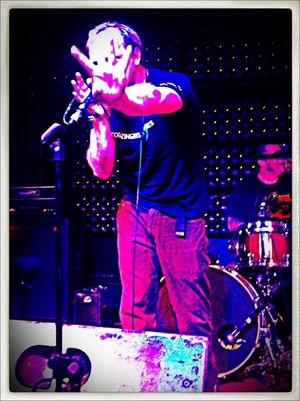By now pretty much everyone knows that Alex Winter, aka Bill from BILL & TED’S EXCELLENT ADVENTURE and its sequels, went on to become a filmmaker in his own right. Whether you know his work from 1993’s bonkers FREAKED or from the Ben 10 films from Cartoon Network, you’ve seen his work. But many don’t know that he’s also an accomplished documentarian, and that his favorite subject is the intersectionality of tech and the individual.
His latest film finds him partnering with mega-producer Gale Ann Hurd, who brought us the TERMINATOR film series and “The Walking Dead” television empire. The film is THE YOUTUBE EFFECT, and while I thought I could infer its content from the title, I was proven wrong. I got the chance to talk to Alex Winter about the film and what hopes lies ahead for us when one company owns the largest slice of the World Wide Web.
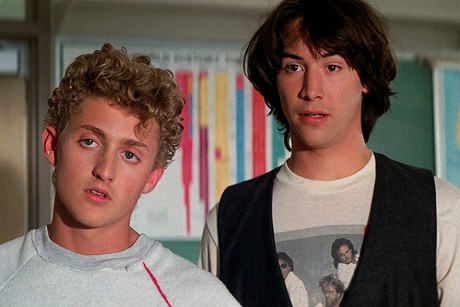
Eric McClanahan - Hey, Alex! How are you?
Alex Winter - Great, Eric. How are you?
EM - I’m great, thanks for having me, or I guess speaking with me today.
AW - Of course.
EM - So we’re talking about The YouTube Effect. Now I see the copyright was 2022. What was the production schedule like? I see a lot of face masks, so when was this filmed?
AW - Over several years. It took us a couple of years to make it. It started 2019, cruising into all the madness of 2020. I’d come off of Zappa, which was this mammoth undertaking, and also in the heat of the political climate and the technological climate where companies were really, especially social media platforms and video and media platforms like YouTube were exploding at an accelerated rate, and it was clear to me that there was a kind of convergence going on between all those things. I’d been making films around the rise of internet based communities for years by then, starting with my Napster documentary Downloaded, so I was very interested in Google’s rise in power. It’s very unprecedented power, and YouTube was Google’s media front end so it was a story I had not seen told. There are a lot of focus on Facebook and Twitter but not a lot on what is inarguably, by an order of magnitude, the largest of any of these platforms, and the largest of any of these companies, so I thought it was high time we took a look at that.
EM - Yeah. So tell me about partnering with Gale Ann Hurd. Getting a producer of that caliber on your side really lended a lot of credibility to the production. Tell me about that partnership.
AW - Absolutely, but to be fair, it was the other way around. Gale came to me after seeing my other tech docs, since she had some access to some tech folks at YouTube and she knew I had some access to some other tech folks so she asked if I was interested in a story around this because she wanted to do a doc around those. So I said absolutely, I’d been looking at Google for years and I would very much like to tell a story that kind of folds those two things together, especially since YouTube is just a division of Google. And I do have a lot of contacts in those spaces, as well, so we really did collaborate. We joined forces and pooled our mutual rolodexes and Gale, as a Stanford grad as well as being Gale, knew a lot of people in the tech space.We, more importantly, shared a mutual vision for the film that A) gave me the freedom to go make the film that I wanted to make and B) allowed me to utilize her expertise. For me, filmmaking is 100% a collaborative medium, and I like working with people from whom I’m going to learn something and whether that’s an editor or a researcher or a writer or, in this case, someone with Gale’s level of expertise, was also very exciting to me.
EM - So early on this film I thought I knew what I was going to see. I thought I knew what this documentary was going to be about. I thought it was going to be about the effect of YouTube giving voice to underrepresented artists, people being able to log on and see people that looked like them expressing themselves, and that diversity and that inclusion. And it does go into how YouTube was absorbed by Google and they took that WorldWide Web that had so much information and so many different avenues of expression and pretty much bottlenecked them into just a couple of major hubs of onboarding. Those are the springboards, those are the tiles on our phones, and I’m wondering if you think that a restricted internet, in that sense, we’ll get into legislation later, but do you think that that ability to narrow the web is a positive or a negative?
AW - That’s a very good way of putting it, and I would agree very much with your perspective, that when YouTube erupted in 2006 and 2007 the reason it caught my eye was for exactly what you just said. It was very evident that now you had ostensibly the two largest currently searched Web portals on the planet, Google being number one and YouTube being number two, now being the central hub for all of the world’s media. And information, not just media. And what that meant. It was clearly going to have a massive impact on the planet, and it did, and it does, and I think the significance of that is overlooked. I think the significance of that impact is overlooked. When people talk about social media platforms or how you should interface with them. They're always talking about “Oh, it’s Facebook, and TikTok, and Twitter,” and sometimes they’ll throw YouTube in at the end and it’s, no, it really isn’t. All of those are over here and Google and YouTube are over here and they’re a mastodon. They’re just so much bigger than those and they’re not just a social media platform - they’re all of the world’s information. In one umbrella, and from a business standpoint, under one corporatized monopoly that has a profit margin that’s bigger than the GDP of most countries. So you’re just dealing with an unimaginable scale, and do I think that’s good? Not particularly. I think that’s rather problematic, and I think that long term, it cannot sustain itself. It should be broken up. It should be less big. I don’t think that’s an easy thing to do, and I don’t think they’ll want to do it to themselves. I think, probably, the closest analog is U.S. Steel and I think we’re in a very similar period of acceleration of an industrial revolution, whereas we’re in a technological revolution, but it’s similar, you know, and as we get into in the film, very specifically.
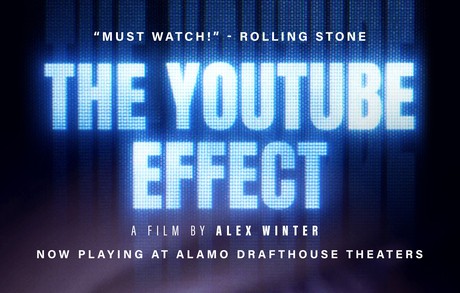
And does that mean that I think that they’re evil and that they’re doing terrible things? Of course it doesn’t, and to your point, the rise of YouTube and the continued benefits are very important to mention. We don’t do it in the movie as a way to create some false sense of balance, right? I genuinely believe that these platforms are important, that YouTube is important, and that we should use them. We should engage with them. They're not some evil entity that we should just shut off and not let our kids get on. I think they’re doing tremendous good and I think there’s a capability here for them to work out most of the most significant problems. Some of those problems are societal and they’ll never be able to work them out. But the scale is a problem, I think, and the monopolized aspect of the way the business runs is a problem.
EM- I will agree there’s definitely a benefit. I know I use YouTube all the time for tutorials if I’m working on my car or making improvements on my house. I am curious what your usage of YouTube looks like. Is it a regularly searched item on your desktop, as well?
AW - Well, I have three boys, right? Two of them are out of the house and they all grew up on YouTube, which shows you how long it’s been around, because one of them is almost 25 years old. And the thing to understand about YouTube and Google, is it’s not really a social media platform or a DIY platform. It’s not any of those things, individually. It’s a search engine. It’s most of the world’s information. It is personal content, creator content, influencers, etc. It’s all of the world’s music, it’s basically our Napster now, right? Most of my kids listen to their music on YouTube. They watch their movies and TV shows on YouTube. So it has essentially combined all of these elements, including the search function of Google, into one thing. It’s so vast, it’s almost impossible to describe its use. It’s use case needs on an individual basis. I’m using it for all of these things all the time. I think the idea that it’s all controlled by one company and the power that it has, especially the negative power, I think that’s a critical thing to be examined. Because I think it’s even more unwieldy than they intended, in that way. I think if you’re Google, which is what the movie is trying to say, is that’s a runaway train.
EM - One of the things that really stood out in the film for me was the Alison Parker story and her father trying so hard to get these videos taken down, and there’s the caveat that if it’s copyright infringement they’ll get it taken down right away. I actually had a YouTube video taken down because of music copyright infringement, but it was my song. I wrote and performed it but it was licensed under some other entity-
AW - That’s happened to other people that I know.
EM - Really annoying! But there’s seemingly nothing Alan Parker can do to make these videos go away. Do you think Article 230 is the answer or do you think maybe what Carrie [Goldberg] was saying about going to the Supreme Court? Is there an answer in this documentary that we can champion?
AW - I think there’s a lot of different problems, so some of them have different answers. I think that content moderation is very difficult, but content moderation is not as difficult as some of these companies claim it is. An example of that is A) stuff that gets taken down, all the time, some of which we don’t want taken down. And B) if you look at what YouTube did last week where they had a policy where they were deplatforming all propaganda that presented the 2020 election as false, right, the Pro Stop the Steal movement? Well, they just stopped doing that last week. Right before an election year. They literally said we will no longer take down content that supports the idea that 2020’s elections was false. That’s crazy! And right before we head into an election with all of this insanity going on. And that’s content moderation they absolutely could do that they’ve made a conscious decision to stop doing. So that’s a problem.
As far as Andy Parker’s concerns go, Section 230 is tricky. This is a problem I have with a lot of copyright law being used as an attempt to protect an end-user. Most of these mechanisms are there to protect the corporate interests, not the individual. Whether it’s copyright law or even Section 230, which protects little websites as much as it protects big websites. If you shut down Section 230, Google is so powerful, they’ll be fine. It’s the little guys that gets screwed, and the ability for real free speech, not the propaganda idea of free speech - the ability to actually communicate and convey and create community would get lost. So, would reforming Section 230 work here? I’m not convinced that it would. Some believe that it would and some of them are way smarter than I am, but I’m not convinced Section 230 would work here. I’m not convinced copyright law would work here. I am very convinced that a giant hammer of regulation and Antitrust law would work here. It’s just difficult to do that when companies like this have as much lobbying power as they do and they’ve bought off equally on the left and the right so I think getting there is going to take time. But I think ultimately the way that we will police these companies is through Antitrust law and probably by breaking them up.
EM - Now what do you think that would look like in 2023 or 2024 as opposed to the birth of the American Empire? Today, with dissemination of information, false information, and the stakes of so many users on the line, the outcry would be a really hard sell.
AW - It’s not going to happen! [laughs] There’s no way! What I’m talking about is not going to happen in this decade. There’s no way. I don’t believe it. I don’t believe that we’re going to see meaningful reform in this space for ten to twenty years. I think we’re going to have to have a lot of the old guard in DC age out, and get replaced by people who grew up online, understand both the mechanics of how these things work and the real world, painful consequences of how they work. Who won’t take such a black and white viewpoint on these things or get caught up in the Satanic Panic of like “AI is going to come to your house and steal your children!” People that do understand that there is benefit to online community, there is benefit to free speech, there is benefit to AI and the nuance of how to actually craft regulation or legislation that’s going to have meaningful change. I don’t think that’s going to happen in the next few years. I think that we’re heading towards a bucking bronco in the next few years, certainly more accelerated than we saw in 2019 or 2020.
EM - So it’s going to get worse before it gets better?
AW - Oh, a hundred percent, it’s going to get worse before it gets better.
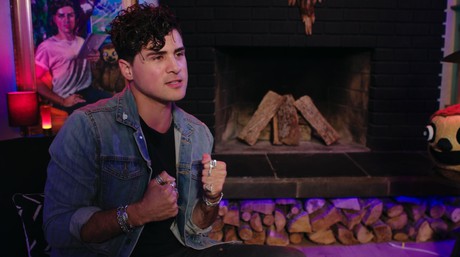
EM - I felt it easy to digest but I don’t want to say “I liked” Anthony’s [Padilla] analogy of the dangerous intersection - that there has to be enough crashes and death before something gets done. Something interesting about the documentary, you spent a lot of time talking to Susan Wojcicki, the longtime CEO of YouTube, who has since resigned. I don’t know all the particulars behind her departure, but do you think that it has anything to do with the pending conversations that things like this documentary will help to stimulate?
AW - I don’t know. It’s impossible to know what goes on in an Ivory Tower that high and that tower-y. I do think that the pressure is going to accelerate on all of these companies. They’re feeling the heat. Zuckerburg is feeling the heat. I don’t think Elon Musk is smart enough to feel heat. But to be fair to Susan, she’s been around since the birth of Google. Like, they built that thing in her garage. So she isn’t just like someone who ran YouTube for a bit and then left - she’s a very big player within Google and YouTube’s landscape. Very smart person. Very interesting person. So I didn’t view her resignation in any way as being that significant. She stepped in to help run the company for a reason, and I don’t think she ever really intended to stay that long. She took it over from other folks, from Steve [Chen] and Chad [Hurley], and so I didn’t really view it with a whole lot of significance. I think if something happens with Sundar [Pichai] and the whole Google brass that would be a bigger deal, but I really didn’t think Susan leaving was a big deal.
EM - Okay, but if we think about the possibility, or the plausibility, of changeups like that happening soon - because, again, we did just recently get Elon and that monkey wrench in the works…
AW - Yeah, that’s just a monkey; not even a wrench.
EM - Do you think that will spur the conversation towards regulation?
AW - Yes, I do. I think that consequences are going to spur the conversation, and I think that it’s impossible at a certain point, to Anthony Padilla’s point that you mentioned earlier, when the crashes are happening to so many different types of people who all suddenly realize that the dangers are real - I think that that creates, even if not change within the company, a lot of motive within the people who are going to be crafting law, who will start saying “This is a really important issue.” Like with climate change, they had to say “Even if you don’t take this seriously, we’re going to take it seriously.” I don’t have a whole lot of faith in the companies to wake up because they’re making so much money and their shareholders would just straight up fire them if they changed their business model, so it wouldn’t even matter if they woke up. They’d just be replaced. So I think that change is going to have to come from without, for the most part, so the more of these conversations that are happening, the better. Like I say in the documentary, I don’t expect them to change policy, but if one 16-year-old kid sees this in high school, then goes to law school, then goes to the Legislature and crafts the legislation that breaks up Google, then job done. We just need one. That’s it!
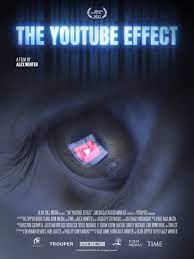
EM - I like that. That’s very optimistic. Now tell me about some of the language decisions you made putting the film together. I noticed the interstitials, you had a wide variety of people staring into their screens - older women, younger children, people of color - and then at the end there was a warbling effect over the quick, speeding up succession of footage of data silos. Tell me what you’re trying to communicate with those?
AW - Well, I think from an aesthetic standpoint I wanted to convey the experience of YouTube. I did this Napster, too, because the Internet is largely a very ugly place. It’s very loud and it’s very aggressive and very kinetic, so I wanted to make a film that was all of those things. I didn’t want to turn it into an art film that was very quiet and esoteric and atmospheric because that’s just not how these things work. So I was intent on showing it in a very aggressive way, but then I also wanted to show how warping that can be on the mind. Not just the cliche of “Oh, if you watch TV your brain is going to melt.” I mean literally, this much information, this much of the world at your fingertips, this much aggression, this much anger being aimed at you to monetize your reaction, and those shifting feelings of that, and also the acceleration of that. All of this stuff is happening faster and faster and faster and getting bigger and bigger and bigger. We wanted to convey that, Wes Cadwell, the editor, and I, and Paul Haslinger, the composer, who is amazing. We really wanted to convey that, and that translated into graphics, too. I used this amazing group of people called Mind Bomb, who I love, who are very artistic and we all sort of worked together to create something that had kind of a synthetic whole to it.
EM - Well, it’s a great film, and I really enjoyed watching it and talking to you. We’re almost out of time so as a man of a certain age I have to take this opportunity to thank you for BILL & TED, all three films, and THE LOST BOYS.
AW - No, thank you.
EM - What was it like stepping back into Ted’s flannel after thirty years?
AW - Bill’s. It’s Bill.
EM - Right, sorry.
AW - It’s okay. It makes Keanu more angry than it makes me, which I find amusing, nonetheless. Uh, it was really fun, but it was hard. Making the movie was really hard, getting it made was hard, finding the characters again at this age was hard. But it was also really sweet, and very fun and very gratifying. And then releasing it during COVID, which we all fought very hard to do. The studio was, understandably, very nervous and not used the releasing films digitally, but we really felt like the fans had waited so damn long and we really didn’t want to say “Hey the movie’s done but it’s going to be another two years!” So that was all very gratifying, to be honest with you, for the people whose this is their thing, to put a smile on their faces at an incredibly challenging time when everyone was stuck at home and the pandemic was raging all over the world, it was a gratifying end in a way, that we could be that one beacon of light amongst a lot of darkness that year.
EM - Yeah, that’s exactly what it was for me, so thank you for getting that done and I really appreciated it.
AW - Thank you.
EM - Well, thanks for talking to me today and best of luck with the documentary.
AW - Thank you, and take care.
Drafthouse Films released THE YOUTUBE EFFECT this past Friday to cinemas nationwide.
Until next time -
-McEric, aka Eric McClanahan-
